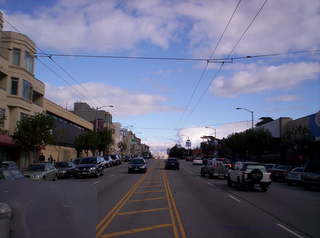Category: Uncategorized
"Charges [that] Kaiser Permanente […] dumped a homeless patient on the city’s downtown Skid Row"
NPR reports:
“The Los Angeles city attorney’s office has filed criminal charges against hospital giant Kaiser Permanente for endangering a former patient. The charges allege Kaiser dumped a homeless patient on the city’s downtown Skid Row.
The charges stem from video captured by security cameras in March. The footage shows a 63-year-old patient from Kaiser Permanente’s Bellflower hospital, dressed in a hospital gown and slippers, exiting a taxicab on Skid Row. She is later seen shuffling toward the Union Rescue Mission, the city’s largest homeless shelter.
Prosecutors describe what happened to Carol Ann Reyes in a 20-page document supporting the false imprisonment and dependent-care abuse charges. Reyes lived mostly in a public park in Gardena before she was hospitalized. When she was discharged, prosecutors say, she wasn’t told she was being taken to Skid Row.
For many months, L.A. city officials have suspected that medical centers and law-enforcement officials from elsewhere are dropping off their indigent patients in the city’s tough Skid Row area. The criminal charges against Kaiser are the first to be filed in the city’s efforts to crack down on the practice.”
Mahmudiya and Hamdania
Gang rape and murder–American forces at work
Perhpas a small percentage of the U.S. and coalition forces in Iraq carry out such atrocities as have come to light. But that does not go any way toward explaining or excusing these outrages, and anyone arguing that just the fact of these tepid courts-martial is proof of things “working” is probably delusional.
BBC News reports on the Mahmudiya case:
“A US Army soldier has pleaded guilty to raping a 14-year-old Iraqi girl and helping murder her and her family.
James Barker agreed to the plea deal at the start of his court-martial in the US to avoid the death penalty, his civilian lawyer said.
A criminal investigation began in June into the killing of the family of four in their home in Mahmudiya, south of Baghdad, in March 2006.
Specialist Barker is one of four US soldiers charged with murder.
They are alleged to have helped a former private – who has since been discharged from the army – to plan, carry out and cover up the attack.”
Reuters updates the Hamdania case:
“In the case at Camp Pendleton near San Diego, Pfc. John Jodka, the second defendant sentenced in the April 26 death of Hashim Ibrahim Awad, pleaded guilty last month to charges of assault and conspiracy to obstruct justice.
Under a plea deal his attorneys hammered out with government prosecutors, Jodka will serve an 18-month sentence in the military brig — getting credit for about six months spent in confinement — if he agrees to testify against his squad mates and assist prosecutors.”
John Abizaid is trying to make people believe that somehow America is improving the situation in Iraq–but also, the burden needs to be shifted to Iraqis. As NPR reports:
“Gen. John Abizaid tells a Senate panel that the status quo in Iraq is not acceptable. But more U.S. troops might be needed, at least temporarily, to train Iraqi forces, Abizaid said.
The general also discouraged calls for a timetable to withdraw. Abizaid, the top U.S. commander in the Middle East, said the security situation in Iraq is improving — and he does not see a need for more U.S. combat troops.”
“Sectarian violence remains high and worrisome,” Abizaid still admitted in front of Congress. Then he talked about “six [more] months.” How many times will the war be sold in installments of six “critical” months (the next six, always)? Why doesn’t he admit failure and urge withdrawal?
[photo: AP]
So what can be said about Iraq? Arthur Silber at powerofnarrative.blogspot.com is probably right:
“And that is the ‘dreadful truth’: we have unleashed forces that no one can now control, probably not for years to come. Moreover, we are now, as we have been for several years, an inextricable and significant part of the problem as long as we remain. There is no point whatsoever in our staying, not in the sense that it will improve the situation.
[…]
Our governing class still searches for a miracle to save them. There will be no such miracle, and the chaos and death will continue into the foreseeable future. But they refuse to admit this — for one unforgivably shabby, despicable reason: they will not admit they were wrong.“
Excerpt from "A Christmas Carol"
Charles Dickens – A Christmas Carol
This lunatic, in letting Scrooge’s nephew out, had let two other people in. They were portly gentlemen, pleasant to behold, and now stood, with their hats off, in Scrooge’s office. They had books and papers in their hands, and bowed to him.
“Scrooge and Marley’s, I believe,” said one of the gentlemen, referring to his list. “Have I the pleasure of addressing Mr Scrooge, or Mr Marley?”
“Mr Marley has been dead these seven years,” Scrooge replied. “He died seven years ago, this very night.”
“We have no doubt his liberality is well represented by his surviving partner,” said the gentleman, presenting his credentials.
It certainly was; for they had been two kindred spirits. At the ominous word “liberality”, Scrooge frowned, and shook his head, and handed the credentials back.
“At this festive season of the year, Mr Scrooge,” said the gentleman, taking up a pen, “it is more than usually desirable that we should make some slight provision for the Poor and destitute, who suffer greatly at the present time. Many thousands are in want of common necessaries; hundreds of thousands are in want of common comforts, sir.”
“Are there no prisons?” asked Scrooge.
“Plenty of prisons,” said the gentleman, laying down the pen again.
“And the Union workhouses?” demanded Scrooge. “Are they still in operation?”
“They are. Still,” returned the gentleman, “ I wish I could say they were not.”
“The Treadmill and the Poor Law are in full vigour, then?” said Scrooge.
“Both very busy, sir.”
“Oh! I was afraid, from what you said at first, that something had occurred to stop them in their useful course,” said Scrooge. “I’m very glad to hear it.”
“Under the impression that they scarcely furnish Christian cheer of mind or body to the multitude,” returned the gentleman, “a few of us are endeavouring to raise a fund to buy the Poor some meat and drink, and means of warmth. We choose this time, because it is a time, of all others, when Want is keenly felt, and Abundance rejoices. What shall I put you down for?”
“Nothing!” Scrooge replied.
“You wish to be anonymous?”
“I wish to be left alone,” said Scrooge. “Since you ask me what I wish, gentlemen, that is my answer. I don’t make merry myself at Christmas and I can’t afford to make idle people merry. I help to support the establishments I have mentioned: they cost enough: and those who are badly off must go there.”
“Many can’t go there; and many would rather die.”
“If they would rather die,” said Scrooge, “they had better do it, and decrease the surplus population. Besides — excuse me — I don’t know that.”
“But you might know it,” observed the gentleman.
“It’s not my business,” Scrooge returned. “It’s enough for a man to understand his own business, and not to interfere with other people’s. Mine occupies me constantly. Good afternoon, gentlemen!”
"Arr Arr Arr Arr" movie starring sea lions
Dinosaur Pictures presents “Arr Arr Arr Arr,” starring the sea lions at the Wharf, Nov. 2006, produced by Daniel J. McKeown and Jessica Dryden-Cook:
Tony Blair: "The boldest liar…also the best"
Premier’s speech charts the same reckless course on Iraq–how long can he hide from war crimes charges for illegal aggression in Iraq he helped to lead and still can’t assess honestly?
Tony Blair lives in a country bound by the International Criminal Court. It is hard to imagine, a year hence when dislodged from 10 Downing Street, that he will long be able to escape indictment for war crimes. In the meantime, he tries to make every last annual event a little more dramatic for being the last. This week the event was the annual foreign policy royal something-like-that speech, where Blair ditched the “red ties” that George W. Bush likes so much in favor of some absurd white bow tie, an English flag, and the same old bluster and lies on foreign policy. As Juan Cole explains on his blog:
“UK PM Tony Blair’s speech on Monday, which had been bruited as a change of course in foreign policy, struck me as just a ‘stay the course’ standard bromide. He blamed Iran for instability in Iraq, whereas most of that comes from the anti-Iranian Sunni Arabs. He blamed Iran for supporting Lebanon, even though he had done nothing to stop the brutal Israeli bombing of south Beirut. He just gave the standard Bush speech, which even Bush may not be giving long.”
Blair is one of the great political minds of this era, and his maneuvering is not to be easily dismissed as simply daft or foolish, as Bush often seemed. David Runciman, writing in the London Review of Books , shows why Tony Blair is such a success in the political climate in which he exists–or to put it less modestly, in the political climate that Tony Blair and Bill Clinton largely created:
“In politics, it is tempting to think that a lie is a lie is a lie, and since everyone is at it, all that matters is what you can get away with. But that is to do Tony Blair a disservice. He is not simply the boldest liar, he is also the best, in that he understands better than anyone the new rules of political fabrication. He comprehensively outmanoeuvred Gordon Brown in Manchester by being truer both to himself and to the spirit of contemporary politics in the way he stretched the truth. Blair was sincere in the lies he told. Brown, by contrast, came across as a straightforward hypocrite.”
[photo: AP via Yahoo]
U.S. auto industry still deep in rut
US car company CEOs ready to complain to president.
The decline of the American auto industry continues, as the Financial Times reports:
“The chief executives of the three US carmakers will tell President George W. Bush on Wednesday that US energy, healthcare and trade policies are blunting their competitive edge against fast-growing Asian rivals.
Mr Bush is to meet Rick Wagoner of General Motors, Alan Mulally of Ford and Tom LaSorda of Chrysler, a division of Germany’s DaimlerChrysler. The get-together, initially set for last spring, will be the president’s first with all three executives.”
Will Google lose their edge in search?
Sarah Milstein, co-author and editor of Google: The Missing Manual, says via radar.oreilly.com:
“‘I use a slew of Google tools every day, my life is richer for them, and I’m not looking to bash the company. But I do wonder where the next search innovations are going to come from, and I’m surprised to find that Google isn’t the obvious answer to that question anymore.'”
The Richmond district of San Francisco
 The Richmond district of San Francisco [pictured: across the Bay on the left side of the Golden Gate Bridge; at the mouth of the Inner Richmond at the intersection of Geary and Masonic; and looking east on California street in Laurel Heights] comprises the area below the Presidio and above Golden Gate Park between the Pacific Ocean and roughly Geary Blvd.
The Richmond district of San Francisco [pictured: across the Bay on the left side of the Golden Gate Bridge; at the mouth of the Inner Richmond at the intersection of Geary and Masonic; and looking east on California street in Laurel Heights] comprises the area below the Presidio and above Golden Gate Park between the Pacific Ocean and roughly Geary Blvd.

 The fog that San Francisco is famous for often comes in thick and can turn the evenings prematurely dark and cool, while the relatively wide streets, low buildings and gentle hills (aside from a few areas like the University of San Francisco campus and Seacliff) remain truly San Francisco in look and feel while welcoming skateboards and bikes.
The fog that San Francisco is famous for often comes in thick and can turn the evenings prematurely dark and cool, while the relatively wide streets, low buildings and gentle hills (aside from a few areas like the University of San Francisco campus and Seacliff) remain truly San Francisco in look and feel while welcoming skateboards and bikes.
Like all of San Francisco, the Richmond is a complex mixture of the special and the universal which is not as easy to unravel as it may as first seem. I have two short movies set in the neighborhood, each named for the part of the Richmond they are set in.
“Journey Into the Outer Richmond” is set in the area past Park Presidio Boulevard, where the fog thickens along Geary all the way out to Ocean Beach. This area is a residential area like many others in San Francisco, but not many people get out that far into the city, so I went for universality. I cut together a few clips from daytime interviews with people bustling along during the day in the busy commercial strip between 16th and 25th Avenues and some clips of activity like people riding bikes and being pulled over.
 “Journey Into the Inner Richmond” is set on a Thursday night, where the week is nearing an end and a few people are telling stories and making deals in the area around 6th Avenue and Clement, while the homeless look on.
“Journey Into the Inner Richmond” is set on a Thursday night, where the week is nearing an end and a few people are telling stories and making deals in the area around 6th Avenue and Clement, while the homeless look on.
The night life in the area is a bit shadier than for most of San Francisco–plenty of local neighborhood dive bars, while the bars trying to compete with the rest of the city seem to cater mainly to college students and the Irish. As the guy in front of the pizza place says, “I don’t know what the f[..]k happened.”



